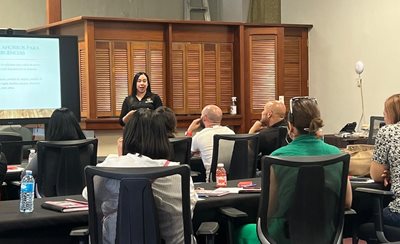Noelia Castro Ramirez remembers the calls she got from clients in February. They'd lost income because of the pandemic and had not been able to recover, she says. "They used their savings up to the point where there was none left." Their mortgage was three months past due. "At some point, the wife cried on the phone."
Castro Ramirez, a housing counselor with Ponce Neighborhood Housing Services in Ponce, Puerto Rico, helped clients fill out the information and even talked with their bank. She also helped fill in information for Homeowner Assistance Funds (HAF). "We kept in communication, sending documents back and forth between the bank and client and HAF."
The client started a payment plan and received a modification – plus $21,000 from HAF. And they Castro Ramirez know how happy and thankful they were for the work and the counseling that they received.
The Keeping People Housed Initiative, made possible through a collaboration with – and funding from – Wells Fargo, helped make that counseling possible. NeighborWorks America launched the initiative in November 2021, with grants to NeighborWorks network organizations with experience serving communities of color. The initiative continued with more support from Wells Fargo this year.

Often, families don't accept that they have a problem until it's too late or they see the bank knocking on the door, Castro Ramirez says. "Most of the clients wait a long time because they believe that at some point, they can solve their issues without anyone's help." Sometimes, they associate counseling with last-resort steps – like declaring bankruptcy – instead of the mitigation options that could save their homes and the financial counseling that could help them keep those homes.
That's another reason Ponce keeps promoting education and counseling – whether people own their homes or rent.
The Keeping People Housed Initiative helps renters, too. Ponce counselors recall a man from Cabo Rojo who dealt with both health problems and the loss of employment. He had difficulty making rental payments and was behind in utility bills for electricity and water. Ponce helped him file for rental assistance and connected him with other resources, like food stamps. Staff also helped him create a budget so he could start a small business from his home.
"These are real families with kids, family members with disabilities, single moms struggling to make things work, elderly people and other vulnerable populations struggling to keep their homes safe and secure from eviction," Colon Rivera emphasizes. "These families are not just numbers or statistics in an Excel spreadsheet. They're human beings."
Moving ahead in Baltimore
"We've been moving right along," shares Cassandra Robb, director of Home Preservation at NHS of Baltimore. At the end of last year, the organization had used funds from Keeping People Housed to prepare doorknockers – a thousand of them – to let the community of West Baltimore know about services that could help prevent foreclosure. After that, she shares, "the calls started coming in."
To keep people housed, the organization has also been helping residents untangle legal titles, a way to assist homeowners in getting property in their name so they can take advantage of state funding for foreclosure prevention. More recently, they've been getting calls about tax sales – when properties are put up for sale by the city because of delinquent mortgages. Part of their work, Robb says, is getting people in the pipeline for state programs, which means scheduling appointments for clients with the HAF program.
By March of 2023, NHS of Baltimore had seen 130 clients facing foreclosure. In fiscal year 2022, when they had 81 applicants, 35 were approved for HAF, while others were still awaiting a decision. Of the 49 clients they saw in the first part of FY 2023, 13 were approved for HAF. Others are still awaiting a decision, or were denied and have since appealed. Only one foreclosure occurred after a final denial.
As with Ponce, counselors see each client as an individual with unique hardships and stories to tell. Learn more about NeighborWorks' Keeping People Housed Initiative, and the people who've been helped through this collaboration:
- Network organizations work to keep people housed
- Outreach and counseling help with 'Keeping People Housed'
- Finding ways to keep people housed

